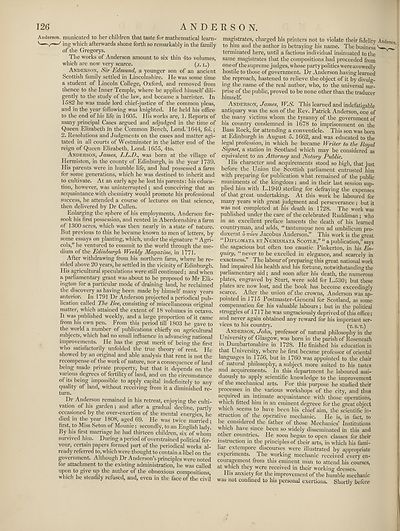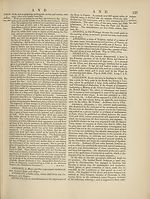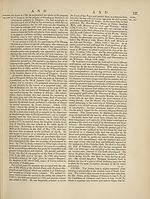Encyclopaedia Britannica > Volume 3, Anatomy-Astronomy
(134) Page 126
Download files
Complete book:
Individual page:
Thumbnail gallery: Grid view | List view

ANDERSON.
126
Anderson, municated to her children that taste for mathematical learn-
ing which afterwards shone forth so remarkably in the family
of the Gregorys.
The works of Anderson amount to six thin 4to volumes,
which are now very scarce. (j. l.)
Anderson, Sir Edmund, a younger son of an ancient
Scottish family settled in Lincolnshire. He was some time
a student of Lincoln College, Oxford, and removed from
thence to the Inner Temple, where he applied himself dili¬
gently to the study of the law, and became a barrister. In
1582 he was made lord chief-justice of the common pleas,
and in the year following was knighted. He held his office
to the end of his life in 1605. His works are, 1. Reports of
many principal Cases argued and adjudged in the time of
Queen Elizabeth in the Common Bench, Lond. 1644, fol.;
2. Resolutions and Judgments on the cases and matter agi¬
tated in all courts of Westminster in the latter end of the
reign of Queen Elizabeth, Lond. 1655, 4to.
Anderson, James, LL.D., was born at the village of
Hermiston, in the county of Edinburgh, in the year 1739.
His parents were in humble life, and had possessed a farm
for some generations, which he was destined to inherit and
to cultivate. At an early age he lost his parents: his educa¬
tion, however, was uninterrupted ; and conceiving that an
acquaintance with chemistry would promote his professional
success, he attended a course of lectures on that science,
then delivered by Dr Cullen.
Enlarging the sphere of his employments, Anderson for¬
sook his first possession, and rented in Aberdeenshire a farm
of 1300 acres, which was then nearly in a state of nature.
But previous to this he became known to men of letters, by
some essays on planting, which, under the signature “ Agri¬
cola,” he ventured to commit to the world through the me¬
dium of the Edinburgh Weekly Magazine, in 1771.
After withdrawing from his northern farm, where he re¬
sided above 20 years, he settled in the vicinity of Edinburgh.
His agricultural speculations were still continued; and when
a parliamentary grant was about to be proposed to Mr Elk-
ington for a particular mode of draining land, he reclaimed
the discovery as having been made by himself many years
anterior. In 1791 Dr Anderson projected a periodical pub¬
lication called The Bee, consisting of miscellaneous original
matter, which attained the extent of 18 volumes in octavo.
It was published weekly, and a large proportion of it came
from his own pen. From this period till 1803 he gave to
the world a number of publications chiefly on agricultural
subjects, which had no small influence in advancing national
improvements. He has the great merit of being the first
w'ho satisfactorily unfolded the true theory of rent. He
showed by an original and able analysis that rent is not the
recompense of the work of nature, nor a consequence of land
being made private property, but that it depends on the
various degrees of fertility of land, and on the circumstance
of its being impossible to apply capital indefinitely to any
quality of land, without receiving from it a diminished re¬
turn.
Dr Anderson remained in his retreat, enjoying the culti¬
vation of his garden ; and after a gradual decline, partly
occasioned by the over-exertion of the mental energies, he
died in the year 1808, aged 69. He was twice married;
first, to Miss Seton of Mounie; secondly, to an English lady.
By his first marriage he had thirteen children, six of whom
survived him. During a period of overstrained political fer¬
vour, certain papers formed part of the periodical works al¬
ready referred to, which were thought to contain a libel on the
government. Although Dr Anderson’s principles were noted
for attachment to the existing administration, he was called
upon to give up the author of the obnoxious compositions,
which he steadily refused, and, even in the face of the civil
magistrates, charged his printers not to violate their fidelity Anderson
to him and the author in betraying his name. The business
terminated here, until a factious individual insinuated to the
same magistrates that the compositions had proceeded from
one of the supreme judges, whose party politics were avowedly
hostile to those of government. Dr Anderson having learned
the reproach, hastened to relieve the object of it by divulg¬
ing the name of the real author, who, to the universal sur¬
prise of the public, proved to be none other than the traducer
himself.
Anderson, James, W.S. This learned and indefatigable
antiquary was the son of the Rev. Patrick Anderson, one of
the many victims whom the tyranny of the government of
his country condemned in 1678 to imprisonment on the
Bass Rock, for attending a conventicle. This son was born
at Edinburgh in August 5. 1662, and was educated to the
legal profession, in which he became Writer to the Royal
Signet, a station in Scotland which may be considered as
equivalent to an Attorney and Notary Public.
His character and acquirements stood so high, that just
before the Union the Scottish parliament entrusted him
with preparing for publication what remained of the public
muniments of the kingdom; and in their last session sup¬
plied him with L.1940 sterling for defraying the expenses
of that great undertaking. At this work he laboured for
many years with great judgment and perseverance; but it
was not completed at his death in 1728. The work was
published under the care of the celebrated Ruddiman ; who
in an excellent preface laments the death of his learned
countryman, and adds, “tantumque non ad umbilicum pro-
duxerat 6 -irdvv Jacobus Anderson.” This work is the great
“Diploma'!’a et Numismata Scotia-:,” “ a publication,” says
the sagacious but often too caustic Pinkerton, in his En¬
quiry, “ never to be excelled in elegance, and scarcely in
exactness.” The labour of preparing this great national work
had impaired his health and his fortune, notwithstanding the
parliamentary aid; and soon after his death, the numerous
plates, engraved by Sturt, were sold for L.530; but these
plates are now lost, and the book has become exceedingly
scarce. After the union of the crowns, Anderson was ap¬
pointed in 1715 Postmaster-General for Scotland, as some
compensation for his valuable labours; but in the political
struggles of 1717 he was ungraciously deprived of this office;
and never again obtained any reward for his important ser¬
vices to his country. (T. s#
Anderson, John, professor of natural philosophy in the
University of Glasgow, was born in the parish of Roseneath
in Dumbartonshire in 1728. He finished his education in
that University, where he first became professor of oriental
languages in 1756, but in 1760 was appointed to the chair
of natural philosophy, a subject more suited to his tastes
and acquirements. In this department he laboured assi¬
duously to apply scientific knowledge to the improvement
of the mechanical arts. For this purpose he studied their
processes in the various workshops of the city, and thus
acquired an intimate acquaintance with those operations,
which fitted him in an eminent degreee for the great object
which seems to have been his chief aim, the scientific in¬
struction of the operative mechanic. He is, in fact, to
be considered the father of those Mechanics’ Institutions
which have since been so widely disseminated in this and
other countries. He soon began to open classes for their
instruction in the principles of their arts, in which his fami¬
liar extempore discourses were illustrated by appropriate
experiments. 4 he working mechanic received every en¬
couragement from this eminent man to attend his courses,
at which they were received in their working dresses.
His anxiety for the improvement of the humble mechanic
was not confined to his personal exertions. Shortly before
126
Anderson, municated to her children that taste for mathematical learn-
ing which afterwards shone forth so remarkably in the family
of the Gregorys.
The works of Anderson amount to six thin 4to volumes,
which are now very scarce. (j. l.)
Anderson, Sir Edmund, a younger son of an ancient
Scottish family settled in Lincolnshire. He was some time
a student of Lincoln College, Oxford, and removed from
thence to the Inner Temple, where he applied himself dili¬
gently to the study of the law, and became a barrister. In
1582 he was made lord chief-justice of the common pleas,
and in the year following was knighted. He held his office
to the end of his life in 1605. His works are, 1. Reports of
many principal Cases argued and adjudged in the time of
Queen Elizabeth in the Common Bench, Lond. 1644, fol.;
2. Resolutions and Judgments on the cases and matter agi¬
tated in all courts of Westminster in the latter end of the
reign of Queen Elizabeth, Lond. 1655, 4to.
Anderson, James, LL.D., was born at the village of
Hermiston, in the county of Edinburgh, in the year 1739.
His parents were in humble life, and had possessed a farm
for some generations, which he was destined to inherit and
to cultivate. At an early age he lost his parents: his educa¬
tion, however, was uninterrupted ; and conceiving that an
acquaintance with chemistry would promote his professional
success, he attended a course of lectures on that science,
then delivered by Dr Cullen.
Enlarging the sphere of his employments, Anderson for¬
sook his first possession, and rented in Aberdeenshire a farm
of 1300 acres, which was then nearly in a state of nature.
But previous to this he became known to men of letters, by
some essays on planting, which, under the signature “ Agri¬
cola,” he ventured to commit to the world through the me¬
dium of the Edinburgh Weekly Magazine, in 1771.
After withdrawing from his northern farm, where he re¬
sided above 20 years, he settled in the vicinity of Edinburgh.
His agricultural speculations were still continued; and when
a parliamentary grant was about to be proposed to Mr Elk-
ington for a particular mode of draining land, he reclaimed
the discovery as having been made by himself many years
anterior. In 1791 Dr Anderson projected a periodical pub¬
lication called The Bee, consisting of miscellaneous original
matter, which attained the extent of 18 volumes in octavo.
It was published weekly, and a large proportion of it came
from his own pen. From this period till 1803 he gave to
the world a number of publications chiefly on agricultural
subjects, which had no small influence in advancing national
improvements. He has the great merit of being the first
w'ho satisfactorily unfolded the true theory of rent. He
showed by an original and able analysis that rent is not the
recompense of the work of nature, nor a consequence of land
being made private property, but that it depends on the
various degrees of fertility of land, and on the circumstance
of its being impossible to apply capital indefinitely to any
quality of land, without receiving from it a diminished re¬
turn.
Dr Anderson remained in his retreat, enjoying the culti¬
vation of his garden ; and after a gradual decline, partly
occasioned by the over-exertion of the mental energies, he
died in the year 1808, aged 69. He was twice married;
first, to Miss Seton of Mounie; secondly, to an English lady.
By his first marriage he had thirteen children, six of whom
survived him. During a period of overstrained political fer¬
vour, certain papers formed part of the periodical works al¬
ready referred to, which were thought to contain a libel on the
government. Although Dr Anderson’s principles were noted
for attachment to the existing administration, he was called
upon to give up the author of the obnoxious compositions,
which he steadily refused, and, even in the face of the civil
magistrates, charged his printers not to violate their fidelity Anderson
to him and the author in betraying his name. The business
terminated here, until a factious individual insinuated to the
same magistrates that the compositions had proceeded from
one of the supreme judges, whose party politics were avowedly
hostile to those of government. Dr Anderson having learned
the reproach, hastened to relieve the object of it by divulg¬
ing the name of the real author, who, to the universal sur¬
prise of the public, proved to be none other than the traducer
himself.
Anderson, James, W.S. This learned and indefatigable
antiquary was the son of the Rev. Patrick Anderson, one of
the many victims whom the tyranny of the government of
his country condemned in 1678 to imprisonment on the
Bass Rock, for attending a conventicle. This son was born
at Edinburgh in August 5. 1662, and was educated to the
legal profession, in which he became Writer to the Royal
Signet, a station in Scotland which may be considered as
equivalent to an Attorney and Notary Public.
His character and acquirements stood so high, that just
before the Union the Scottish parliament entrusted him
with preparing for publication what remained of the public
muniments of the kingdom; and in their last session sup¬
plied him with L.1940 sterling for defraying the expenses
of that great undertaking. At this work he laboured for
many years with great judgment and perseverance; but it
was not completed at his death in 1728. The work was
published under the care of the celebrated Ruddiman ; who
in an excellent preface laments the death of his learned
countryman, and adds, “tantumque non ad umbilicum pro-
duxerat 6 -irdvv Jacobus Anderson.” This work is the great
“Diploma'!’a et Numismata Scotia-:,” “ a publication,” says
the sagacious but often too caustic Pinkerton, in his En¬
quiry, “ never to be excelled in elegance, and scarcely in
exactness.” The labour of preparing this great national work
had impaired his health and his fortune, notwithstanding the
parliamentary aid; and soon after his death, the numerous
plates, engraved by Sturt, were sold for L.530; but these
plates are now lost, and the book has become exceedingly
scarce. After the union of the crowns, Anderson was ap¬
pointed in 1715 Postmaster-General for Scotland, as some
compensation for his valuable labours; but in the political
struggles of 1717 he was ungraciously deprived of this office;
and never again obtained any reward for his important ser¬
vices to his country. (T. s#
Anderson, John, professor of natural philosophy in the
University of Glasgow, was born in the parish of Roseneath
in Dumbartonshire in 1728. He finished his education in
that University, where he first became professor of oriental
languages in 1756, but in 1760 was appointed to the chair
of natural philosophy, a subject more suited to his tastes
and acquirements. In this department he laboured assi¬
duously to apply scientific knowledge to the improvement
of the mechanical arts. For this purpose he studied their
processes in the various workshops of the city, and thus
acquired an intimate acquaintance with those operations,
which fitted him in an eminent degreee for the great object
which seems to have been his chief aim, the scientific in¬
struction of the operative mechanic. He is, in fact, to
be considered the father of those Mechanics’ Institutions
which have since been so widely disseminated in this and
other countries. He soon began to open classes for their
instruction in the principles of their arts, in which his fami¬
liar extempore discourses were illustrated by appropriate
experiments. 4 he working mechanic received every en¬
couragement from this eminent man to attend his courses,
at which they were received in their working dresses.
His anxiety for the improvement of the humble mechanic
was not confined to his personal exertions. Shortly before
Set display mode to:
![]() Universal Viewer |
Universal Viewer | ![]() Mirador |
Large image | Transcription
Mirador |
Large image | Transcription
Images and transcriptions on this page, including medium image downloads, may be used under the Creative Commons Attribution 4.0 International Licence unless otherwise stated. ![]()
| Encyclopaedia Britannica > Encyclopaedia Britannica > Volume 3, Anatomy-Astronomy > (134) Page 126 |
|---|
| Permanent URL | https://digital.nls.uk/193759090 |
|---|
| Attribution and copyright: |
|
|---|---|
| Shelfmark | EB.16 |
|---|---|
| Description | Ten editions of 'Encyclopaedia Britannica', issued from 1768-1903, in 231 volumes. Originally issued in 100 weekly parts (3 volumes) between 1768 and 1771 by publishers: Colin Macfarquhar and Andrew Bell (Edinburgh); editor: William Smellie: engraver: Andrew Bell. Expanded editions in the 19th century featured more volumes and contributions from leading experts in their fields. Managed and published in Edinburgh up to the 9th edition (25 volumes, from 1875-1889); the 10th edition (1902-1903) re-issued the 9th edition, with 11 supplementary volumes. |
|---|---|
| Additional NLS resources: |
|

